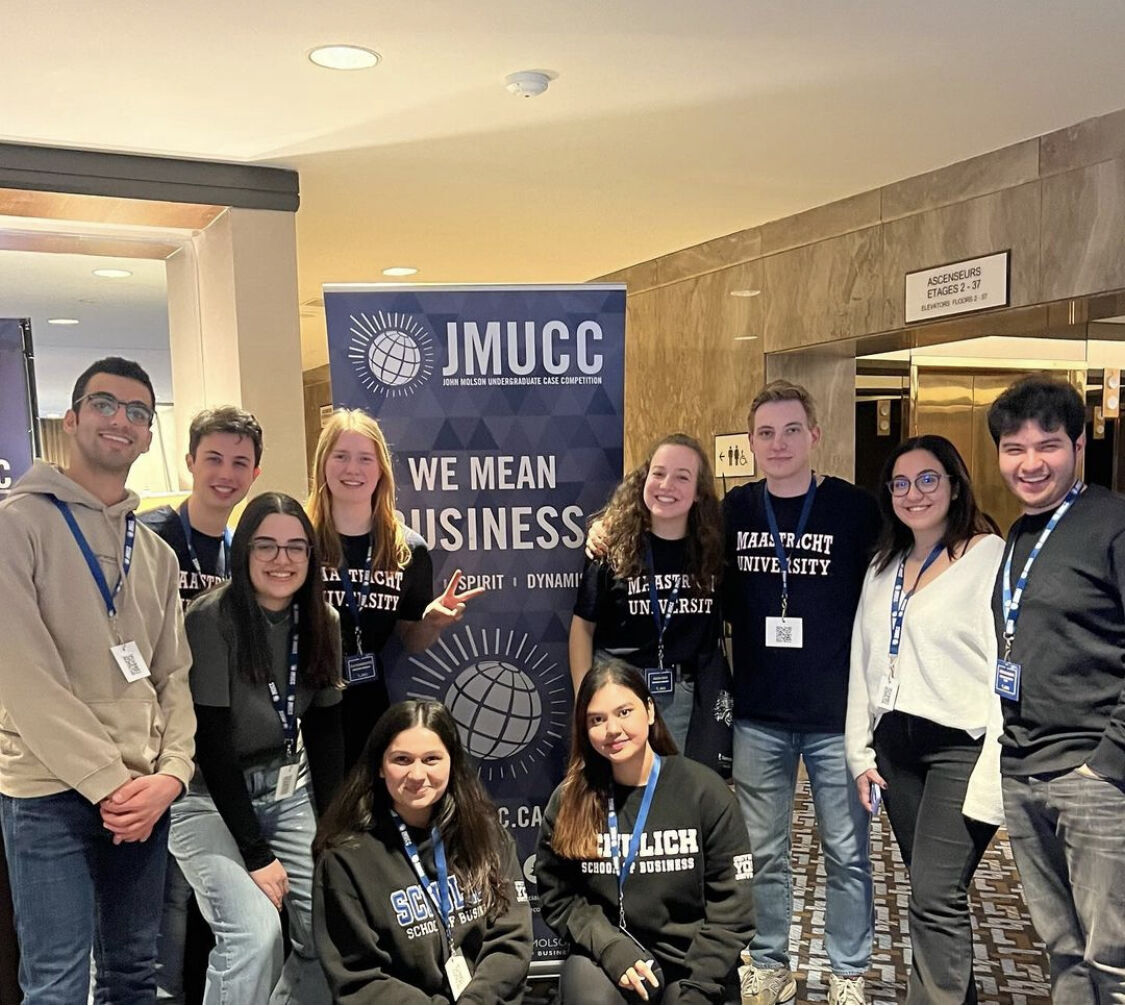Abbas Hasnain, BBA ’16 sat down with Ajaypal Singh, BBA ’15 to discuss his experience in pursuit of the Certificate in Managing International Trade and Investment (CMITI).
Abbas: Why did you decide to pursue the Certificate?
Ajaypal: I decided to pursue the certificate because business is constantly moving on a global platform. By understanding the benefits of going global I have the tools that can assist a corporation to reduce cost, expand, improve a company’s image, etc. Corporations are constantly trying to expand their operations overseas, therefore when the Certificate was launched I knew this would help my professional career.
As a young professional it is my dream to travel and work. This Certificate allows room for a specialization as well, allowing me to practice in my field, but now on a global scale. The Certificate is truly a bonus.
Abbas: What are some of the key skills you have learned?
Ajaypal: The mix of various courses with experienced professors gave me a hands on approach to real life situations. The key skills I have learned thus far can be divided into business practices and business expansion.
IBUS 4200 is a great course which overlooks business practices which focuses on everyday situations you may encounter. Before this certificate I was a bit oblivious to certain customs such as not everyone shakes hands, or in China it is rude to finish your meal. These concepts have allowed me to understand that when entering a country or region each and everyone one is different.
This seminar course offered a total of 10 speakers from various backgrounds which presented a situation or an overview of their company, pulling from various experiences. From the mining industry to automotive we learned about expansion strategies that failed and succeeded for Scotia Bank, or contracts that went downhill for Pepsi and even how Magna’s structure allows it to strive.
IBUS 3200 focuses on business expansion which overlooks what factors a corporation needs to analyze when entering a market. For example understanding the political environment, currency fluctuations, laws which govern trading, social environment etc. Most importantly you understand business as one function, not split into various courses but all of them coming together. Understanding you need to alter the marketing or follow different accounting laws or dress a certain way in order to connect with co-workers.
The main skill you learn is a change of mindset. Understanding that each region, person and corporation is different and you have to adapt accordingly.
Abbas: How are the Certificate courses different?
Ajaypal: We have a very hands on experience. We went to Canadian Tire and Magna to see how operations are done. It gives you a great understanding of process. We similarly had this professor who took us downtown where we met a delegation from Thailand. It allows you to learn more from experience as compared to sitting behind a desk and learning.
The final course which expanded my mind more then any course thus far has to be ORGS 4400. The various activities allowed international experience, but in the class. One activity in particular was a card game. In this game there was no talking, each team was divided into 5 players and given an outline of rules. A winner will rotate left and a loser will rotate right. What we came to realize was that each game was different, and there was no talking allowed.
The international lesson we quickly learned was that each country and region you travel to is different. There will be different rules and a lack of communication, how will you react? Many individuals took charge and changed the rules to their own, others were confused and a handful adapted accordingly. The activity was a note on how you would do in an international environment.
Another great activity was when each student was given a discrete trait such as not shaking your hand, looking you in the eyes while speaking, standing to close or turning their back to you. Each of these are norms in Canadian culture, but not around the world. Students interacted with one another and were taken back by the attitudes of their classmates. The activity took note that around the world these are real business practices. You don’t always shake someone’s hand!
This course really teaches that you cannot be knowledgeable about every business practice, but understand that they are different around the world and offer you the tools to adapt accordingly.
Abbas: Is the Certificate a good complement to other specializations?
Ajaypal: One of the things that I think is not too well known about the Certificate is that, for the most part, you automatically specialize in Responsible Business. Responsible business is a very huge concern in the current business environment and it adds a lot of value to your degree. Furthermore, you can include strategic management into it as well. It is very convenient, and easy to do. It goes hand in hand with a bunch of specializations overall. For example, if you specialize in finance, the certificate is a perfect complement since it is a specializes in international investments. Similarly, marketing for example, consumer behaviour considerations are throughout the certificate. Cultural aspects are pointed out. It gives you a great lens to look at the market with. Organization Studies, Economics, Operations Management… basically – pretty much every single specialization is complemented by the Certificate.
Abbas: Is it difficult for BBA and iBBA students to complete the Certificate?
Ajaypal: I have to admit, it is slightly easier for the iBBAs to complete, but it is still not as difficult for people in the BBA program. We have to take a few extra courses, but as I said, they serve for specializations, and it is very convenient. You have to take additional courses anyway along with your specialization. You can just fill these gaps with the Certificate courses. In addition, you can do courses on exchange and trust me; it’s really not that many courses. Once you start planning out your 3rd and 4th year, you will see that it’s not that many extra courses that you have to take.
Abbas: Any examples of how this additional knowledge gained from the Certificate has helped you?
Ajaypal: I recently had an interview at Manulife. The interview was for an analyst position, so I went into the interview after having looked into Manulife’s recent numbers. It is a very competitive and coveted position, and I wanted to be prepared for it beforehand. So, I walked in to the interview with one of the managers at Manulife, and I told him “Oh, before the interview, I had the opportunity to go through your numbers, …” and I gave him my analysis about how their insurance is dropping in America due to a decrease in middle class families. My solution was that they should target South America. He asked me why? And I explained to him how jobs are increasing in South America due to Scotiabank’s foray into the market there, and the insurance market will increase drastically in the near future.
And guess what? I am working this summer at Manulife Financial. This perspective and outside of the box thinking is what makes the Certificate so invaluable. I do not think I could’ve come up with such an analysis without the Certificate. The Certificate trains you to look at everything from an international perspective.
Abbas: How has your career path been affected by the Certificate?
Ajaypal: I landed an internship opportunity by simply engaging the speaker during my seminar class. It was a speaker from Magna, who has now offered me an opportunity to work in the United States in September. I am heading over to their head office in the United States starting September 15.
I asked a lot of questions. I was very active during the session and once the session was done, I just went up to him and started talking. I spoke about general stuff with him and I kept in touch with him over email. They have been doing a lot of work, in respect of technicalities, to have me there with them. He did not even interview me. They are taking a risk on me and I attribute it totally to the Certificate and my development as a person over the past year.
Abbas: With the Certificate being new, do students get enough guidance and support?
Ajaypal: The school is with you at every step throughout the Certificate. Prof. Bernie Wolf has been a great resource and highlighting opportunities. If you complete a CMITI Intent Form and submit it to the UPU, they will guide you, make sure you are taking the right courses and track your progress. The administration is working incredibly hard to give us the best experience we can possibly get from the Certificate, and I have to say they are doing a very impressive job. We have some incredible opportunities. For example, just recently we were invited to this breakfast downtown, where we had representatives from Vietnam – and they cover the cost of the ticket. They offer you a lot of direction and counselling. You cannot possibly go wrong.
Interested in the Certificate in Managing International Trade and Investment (CMITI)? Complete a CMITI Intent Form and submit it to the Undergraduate Programs Unit. Submitting the form will allow us to track your progress and you can discontinue your pursuit of the Certificate at anytime.






Leave A Comment